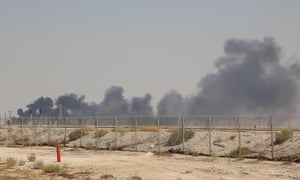Simon Tisdall
 Donald Trump’s hostility towards Iran and support for Saudi Arabia has made a delicate situation explosive
Donald Trump’s hostility towards Iran and support for Saudi Arabia has made a delicate situation explosive
Like a furious maelstrom, roiled by opposing currents, the crisis in the Gulf gains in intensity and destructive power almost by the day. On Sunday, Donald Trump said the US was “locked and loaded”, ready to respond to attacks on an oil facility in Saudi Arabia, in which it believes Iran was involved. But warning bells, akin to those used to alert fog-bound mariners steering towards rocks, have been ringing out for months. They have mostly been ignored. The daunting bill for multiple acts of political insouciance, measured in lives and petrodollars, is now coming due.
Trump is even trying to sell the Saudis nuclear technology. What would you think, were you in Iran’s shoes?
It’s easy and convenient to solely blame Iran, as American and British officials routinely do without conclusive evidence. Rather, it is serial western and regional miscalculations that have drawn us ineluctably into this dread vortex.
How can disaster be averted? Who can stop a slide into a wider war that could swiftly engulf regional states from Israel to Saudi Arabia, and drag in US, British and maybe even Russian forces? Clues can be found in the mistakes that led to this point. Answers, if they exist, will only come through informed statesmanship of the sort signally lacking so far.
Mention of which brings us, first, to Trump and Iran. Tehran’s regime has been viewed as a threat by the US since the 1979 revolution. But it was Trump, with his unrivalled ability to make bad situations worse, who ripped up the Iran nuclear deal on 8 May last year, imposed punitive economic sanctions, and sparked the immediate crisis. His enmity has hurt Iran’s citizens – but not the regime.
In erring so idiotically, Trump preferred the advice of his discredited former national security adviser, John Bolton, over the personal pleadings of Angela Merkel and Emmanuel Macron. He also gave short shrift to his chum Boris Johnson, then foreign secretary, who made a last-minute dash to Washington. A damaging rift with Europe over Iran began that day.
Iran’s fractious, fractured leadership rallied, improbably unified by Trump. Military and clerical hardliners are now taking the fight – a fight, as they see it, against regime change by the US – to their enemies, principally the Saudis and Israelis.
Old geopolitical faultlines were recklessly aggravated and inflamed. Any sensible policy would seek to balance the regional claims of Shia Muslim Iran and the Sunni house of Saud. But the west – turning a blind eye for decades to pitiless autocracy, legalised misogyny and religious bigotry – has continued to court Riyadh and its corrupting riches.
Here again Trump jumped in, making shockwaves. Not content to cement the Saudi alliance during his first overseas visit as president, Trump made crown prince Mohammed bin Salman his new best friend. When the dissident journalist Jamal Khashoggi was murdered by Saudi agents, Trump turned defence attorney. He is even trying to sell Salman nuclear technology. What would you think, were you in Iran’s shoes?
The failure of US and British leaders, among others, to halt Salman’s disastrous war of choice in Yemen marked another stage in this downward spiral. Ignoring war crimes and what the UN calls a worst-in-the-world humanitarian catastrophe, they continue to peddle arms, advice and diplomatic cover for Riyadh.
When the Yemen civil war began in 2015, there was scant evidence of active Iranian military support for the Houthi rebels. Yet now, reacting opportunistically to US attrition, Tehran’s Revolutionary Guards are apparently supplying – directly or indirectly – the drones, missiles and limpet mines used to attack Saudi oil fields, airfields and tankers.
What a result. Let’s presume to question the US’s chief diplomat, Mike Pompeo, about this extraordinary own goal. Hey, Mike, how do you turn a disagreement into a war? His answer: punch your opponent into a corner from which he cannot escape. What did Trump, Bolton and CIA director Gina Haspel think would happen when the US shredded the enrichment deal? What’s happening is that Iran is resuming the very activities that so alarm them.
Or here’s a question for another well-known international statesman: Israel’s prime minister, Benjamin Netanyahu. Is Iran already seeking to acquire nuclear weapons, as you claim – or are your pressure tactics more or less guaranteeing that it will? If it does, then that, surely, will be in large part thanks to your endless sabre-rattling. How does this make Israel safer?
This threat of general conflagration, whipped up by design or sheer incompetence, now overshadows the region as a whole. In the name of repulsing Iran, Israel is almost daily engaged in covert military operations against Tehran’s allies and proxy forces in Lebanon, Iraq and Syria – where, shamefully, civil war still rages.
It gets worse. Reports from Kuwait say the drones that hit the Saudi oil installations at the weekend overflew the country, suggesting they came from Shia militia bases in Iraq. In this developing regional war, Israel and the Saudis are, in effect, on the same side. Iraq’s government wants no part of it. But, thanks to the vacuum left by the US after the 2003-11 occupation, Tehran wields considerable influence in Baghdad.
The very last thing Iraqis want is the Americans coming back, using their territory as a forward base in a wider Iranian siege. Yet Trump suggested exactly that last year. Can this scenario be ruled out? Not entirely. And so reason takes flight and the maelstrom builds. Urgently needed now are competent leaders who know how to calm a storm before all are sucked under.
No comments:
Post a Comment